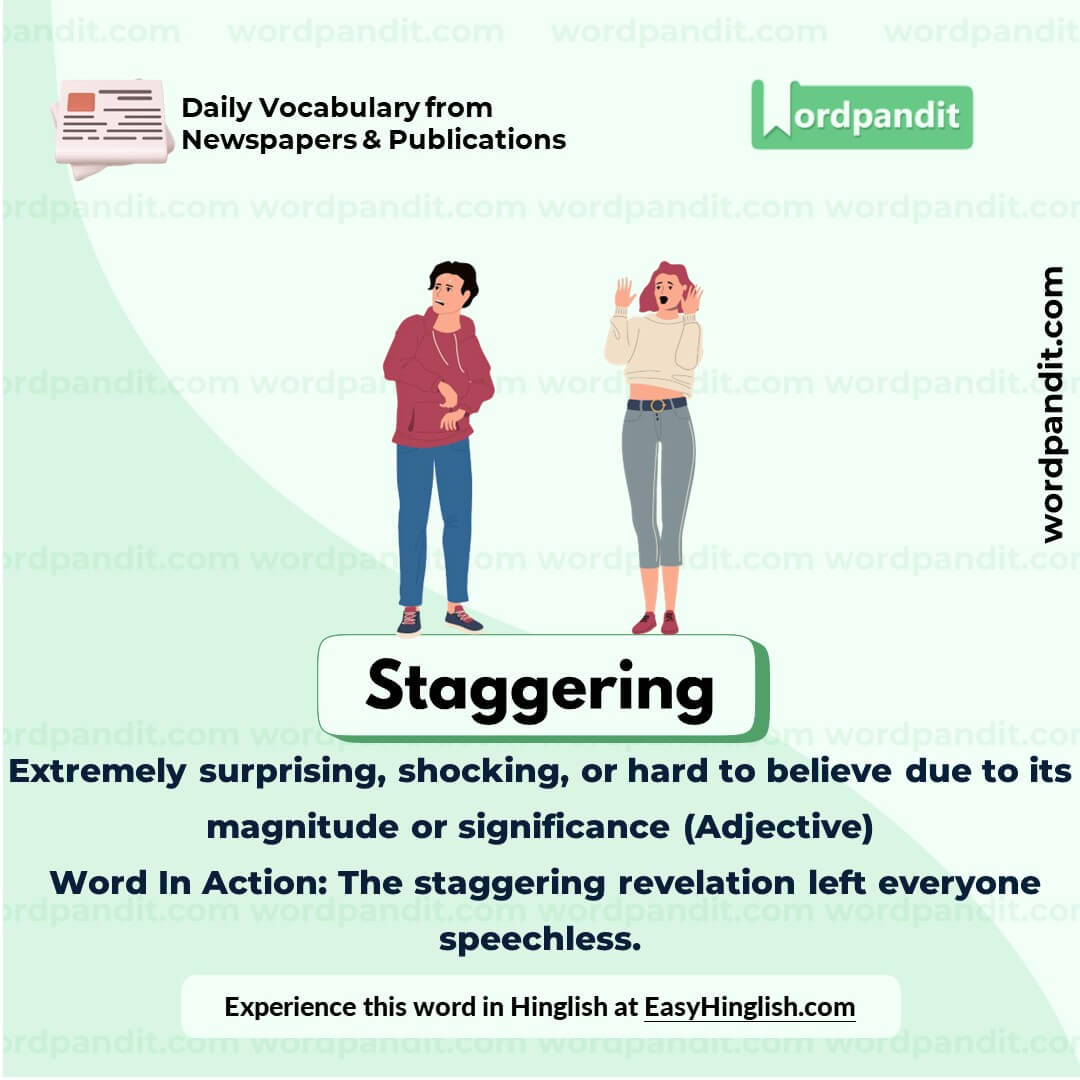Daily Vocabulary from International Newspapers and Publications
Expand Your Vocabulary with Wordpandit’s Global Vocabulary Hub
At Wordpandit, we are committed to helping you develop a truly global vocabulary by drawing from some of the most respected international publications. This section is designed to keep you ahead of the curve by introducing you to words that define global conversations and trends.
The Power of Global Sources
To help you think and communicate on a global scale, we curate vocabulary from renowned international sources, such as:
- The New York Times
- The Washington Post
- BBC
- The Guardian
- The Economist
- Scientific American
- Psychology Today
- And many more...
Stay Global, Stay Competitive
Our daily updates from international publications ensure you are consistently exposed to new words that reflect global news and developments, making sure your vocabulary is not only current but also globally relevant.
Enhance Your Global Perspective
Whether you’re preparing for international exams, aiming to excel in global business communication, or want to enhance your language skills for personal growth, Wordpandit offers the resources you need to thrive in a global context.
Effective Learning, Global Reach
Our learning methodology combines global examples, memory aids, and interactive activities, allowing you to internalize new words effectively and apply them in real-world scenarios.
Begin Your Global Vocabulary Journey Now!
Why Choose Wordpandit?
Practical Learning: Focus on words you'll actually encounter in real-world reading, enhancing your comprehension and communication skills.
Diverse Content: From current affairs to scientific breakthroughs, our varied sources expose you to vocabulary across multiple domains.
Effortless Integration: Make Wordpandit a part of your daily routine. Just a few minutes each day can significantly boost your lexicon over time.
Your Path to Vocabulary Mastery
- Visit our Daily Vocabulary section regularly
- Explore new words and their usage in context
- Practice incorporating these words into your own writing and speech
- Track your progress as your vocabulary expands
Start Your Journey Today
Embark on your vocabulary enhancement journey with Wordpandit. By consistently engaging with our daily posts, you'll build a robust vocabulary that serves you well in academic, professional, and personal contexts.
Remember, a word a day keeps linguistic limitations at bay. Make Wordpandit your daily companion in the quest for vocabulary excellence!
WORD-1: Vindictive
Context:
"That’s why I’m urging President Biden to issue a blanket pardon for anyone unjustly targeted by this vindictive scheme.” - The Washington Post
Explanatory Paragraph:
The word "vindictive" describes someone who is inclined to seek revenge or act with malice, often displaying an unforgiving or retaliatory attitude. It is frequently used to highlight an excessive desire to punish others or harbor grudges.
Meaning: Having or showing a strong or unreasoning desire for revenge (Adjective)
Pronunciation: vin-DIK-tiv
Difficulty Level: ⭐⭐⭐ Intermediate
Etymology: Derived from the Latin word "vindicta," meaning vengeance or retribution, and the verb "vindicare," meaning to avenge or assert a claim.
Synonyms & Antonyms:
Synonyms: revengeful, spiteful, malicious, resentful
Antonyms: forgiving, merciful, kind, compassionate
Usage Examples:
- The manager's vindictive decision to fire the employee over a minor mistake revealed his true nature.
- Her vindictive behavior after losing the competition alienated her friends.
- It’s important to approach conflicts with a fair perspective rather than a vindictive mindset.
- The novel’s antagonist was portrayed as a vindictive character, driven by past grievances.
Cultural Reference:
"Vindictiveness is like drinking poison and expecting the other person to die," a phrase popularized in discussions about the corrosive effects of holding grudges, emphasizes the self-destructive nature of such attitudes.
Think About It:
What role does vindictiveness play in conflicts, and how can understanding this trait help in resolving disputes more effectively?
Quick Activity:
Think of a situation where someone acted vindictively. Rewrite the outcome by imagining the person acted with forgiveness instead. What changes would occur?
Memory Tip:
Link "vindictive" to "vindicate," which means to justify or avenge. A vindictive person seeks vengeance, just like vindicate seeks justice.
Real-World Application:
The word "vindictive" is often used in legal or interpersonal contexts to describe actions or behaviors that are punitive in nature, helping to identify and address unfair biases in decisions or relationships.
WORD-2: Tremendous
Context:
"Throughout history, communities have demonstrated a tremendous ability to think for themselves and, more than that, to resist, in an entirely pragmatic fashion." - Aeon
Explanatory Paragraph:
The word "tremendous" conveys a sense of something being exceptionally large, powerful, or impressive. It can describe physical size, emotional impact, or abstract qualities like strength or effort. Its use often underscores admiration or awe.
Meaning: Extremely large, powerful, or impressive in size, strength, or degree (Adjective)
Pronunciation: truh-MEN-duhs
Difficulty Level: ⭐⭐ Beginner
Etymology: Originates from Latin tremendus, meaning "to be trembled at" or "dreadful," which is derived from tremere, meaning "to tremble."
Synonyms & Antonyms:
Synonyms: Enormous, colossal, vast, massive, phenomenal
Antonyms: Tiny, insignificant, trivial, small
Usage Examples:
- The team put in a tremendous amount of effort to finish the project on time.
- The earthquake caused tremendous damage to the region, leaving many homes in ruins.
- Her tremendous enthusiasm for teaching inspired her students to learn eagerly.
- The concert was a tremendous success, with the audience giving a standing ovation.
Cultural Reference:
"Tremendous power lies in the hands of those who unite," reflects a theme often explored in stories like Victor Hugo’s Les Misérables, where collective effort achieves the extraordinary. - Adapted from literary analysis
Think About It:
What qualities make a person or event tremendous in your perspective, and how can recognizing these qualities inspire others?
Quick Activity:
Think of a tremendous achievement in your life or history. Write a short paragraph explaining why it stands out and what made it so impressive.
Memory Tip:
Associate "tremendous" with "tremble"—imagine something so powerful or amazing that it makes the earth tremble.
Real-World Application:
The word "tremendous" is often used in speeches, advertisements, and news to emphasize achievements, efforts, or natural phenomena. It’s a versatile term that can inspire awe or highlight significance.
WORD-3: Outspoken
Context:
"...who led the first impeachment effort against Trump; and former congresswoman Liz Cheney (R-Wyoming), an outspoken GOP critic of Trump." - The Washington Post
Explanatory Paragraph:
The word "outspoken" refers to someone who expresses their opinions openly, honestly, and often boldly, even if their views may be controversial or unpopular. It highlights the quality of being direct and unafraid in communication.
Meaning: Expressing opinions frankly and without hesitation (Adjective)
Pronunciation: OUT-spoh-kuhn
Difficulty Level: ⭐⭐ Beginner to Intermediate
Etymology: Derived from the Middle English phrase "outen" meaning "to speak out" and "spoken," indicating verbal expression.
Synonyms & Antonyms:
Synonyms: candid, frank, forthright, vocal
Antonyms: reserved, silent, reticent, tactful
Usage Examples:
- The activist was known for her outspoken criticism of environmental policies.
- His outspoken nature sometimes put him at odds with his colleagues.
- The journalist’s outspoken articles challenged the status quo.
- Despite facing backlash, she remained outspoken about her beliefs.
Cultural Reference:
Rosa Parks, an outspoken figure in the Civil Rights Movement, boldly challenged racial segregation, sparking nationwide protests and change.
Think About It:
Is being outspoken always beneficial, or can it sometimes create unnecessary conflict? How can one balance honesty with tact?
Quick Activity:
Identify a public figure you consider outspoken. Write a short paragraph explaining how their outspoken nature has influenced their field or society.
Memory Tip:
Remember "outspoken" by breaking it down: "out" (expressing) and "spoken" (said). Together, it signifies speaking out boldly.
Real-World Application:
The word "outspoken" is frequently used to describe activists, leaders, or anyone unafraid to share their honest views, making it an important descriptor in media, politics, and everyday life.
WORD-4: Staggering
Context:
"The Vietnam memorial is minimalist in its design: two black granite walls stretch across a lawn and meet to form a wide angle; they are engraved with the names – staggeringly numerous – of fallen US service members." - Aeon
Explanatory Paragraph:
The word "staggering" refers to something so shocking, overwhelming, or astonishing that it leaves one in awe or disbelief. It often emphasizes a degree of magnitude or importance that is hard to fully grasp.
Meaning: Extremely surprising, shocking, or hard to believe due to its magnitude or significance (Adjective)
Pronunciation: STAG-uh-ring
Difficulty Level: ⭐⭐⭐ Intermediate
Etymology: Derived from Middle English stakeren, meaning "to totter" or "to move unsteadily," later evolving metaphorically to convey the overwhelming effect of something vast or impressive.
Synonyms & Antonyms:
Synonyms: Overwhelming, astounding, astonishing, mind-blowing, shocking
Antonyms: Ordinary, unremarkable, unimpressive
Usage Examples:
- The staggering number of species lost to deforestation highlights the urgency of conservation efforts.
- The cost of the new development project is staggering, reaching billions of dollars.
- Her staggering success at such a young age left everyone speechless.
- The view from the mountain peak was staggering in its beauty and vastness.
Cultural Reference:
The phrase "staggering achievement" is often used in the context of scientific breakthroughs, such as the moon landing in 1969, which was described as a "staggering leap for mankind." - Adapted from historical commentary
Think About It:
What recent events or accomplishments have left you feeling staggered, and why did they have such an impact on you?
Quick Activity:
List three things in the world that you find staggering, whether in nature, science, or human achievements, and explain why.
Memory Tip:
Think of "staggering" as something so surprising that it makes you "stagger" backward in disbelief.
Real-World Application:
"Staggering" is frequently used in news reports, documentaries, and speeches to describe shocking statistics, immense challenges, or extraordinary achievements. It captures the magnitude of an event or fact effectively.
WORD-5: Unjustly
Context:
"That’s why I’m urging President Biden to issue a blanket pardon for anyone unjustly targeted by this vindictive scheme.” - The Washington Post
Explanatory Paragraph:
The word "unjustly" refers to actions or decisions made in a way that lacks fairness, equity, or justice. It is often used to highlight situations where individuals or groups are treated unfairly, improperly, or without moral justification.
Meaning: In a manner that is not fair or just (Adverb)
Pronunciation: un-JUHST-lee
Difficulty Level: ⭐⭐ Beginner to Intermediate
Etymology: Derived from the Old English "un-" meaning "not" and "justly," from the Latin "justus," meaning "fair" or "right."
Synonyms & Antonyms:
Synonyms: unfairly, improperly, wrongfully, inequitably
Antonyms: fairly, justly, equitably, rightly
Usage Examples:
- The employee felt he was unjustly dismissed without a proper explanation.
- History is filled with examples of groups being unjustly persecuted for their beliefs.
- Many argued that the court's ruling unjustly favored the wealthy corporation.
- The teacher realized she had unjustly blamed the wrong student for the mistake.
Cultural Reference:
Dr. Martin Luther King Jr.'s letter from Birmingham Jail discusses the moral responsibility to fight unjust laws, emphasizing the importance of justice and fairness in society.
Think About It:
What systems or mechanisms can societies put in place to ensure individuals are not treated unjustly?
Quick Activity:
Think of a time when you witnessed someone being treated unjustly. Write down how the situation could have been handled more fairly.
Memory Tip:
Break down "unjustly" into "un-" (not) and "just" (fair). If something is unjustly done, it is "not fair."
Real-World Application:
The word "unjustly" is frequently used in legal, social, and ethical discussions to highlight issues of inequality, discrimination, and unfair treatment.
















